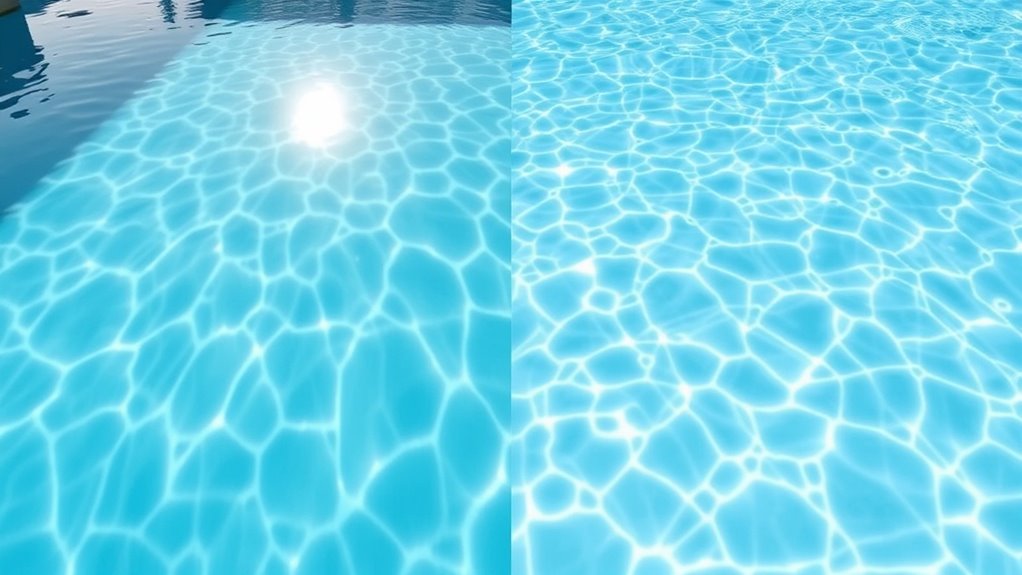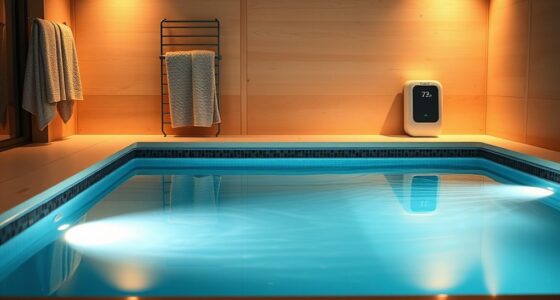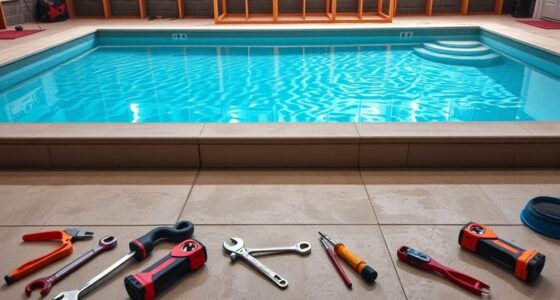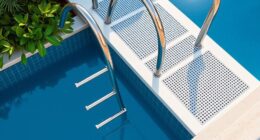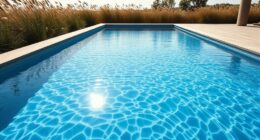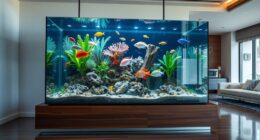Choosing between saltwater and chlorine for your endless pool depends on your priorities. Saltwater systems offer smoother, softer water with fewer harsh chemicals, reducing skin and eye irritation, and tend to be easier on your equipment and environment. Chlorine systems are budget-friendly upfront but require more maintenance and chemical handling. To find the best fit for your pool lifestyle and long-term enjoyment, explore the detailed pros, cons, and maintenance tips.
Key Takeaways
- Saltwater pools offer softer water with less skin and eye irritation compared to traditional chlorine systems.
- Saltwater systems have higher initial costs but lower ongoing chemical expenses and maintenance.
- Saltwater pools produce fewer harmful byproducts and are more eco-friendly overall.
- Proper maintenance of both systems is essential to prevent equipment corrosion and ensure longevity.
- Consider your budget, pool usage, and sensitivity preferences to choose the best system for your Endless Pool.
Understanding the Chlorine and Saltwater Systems
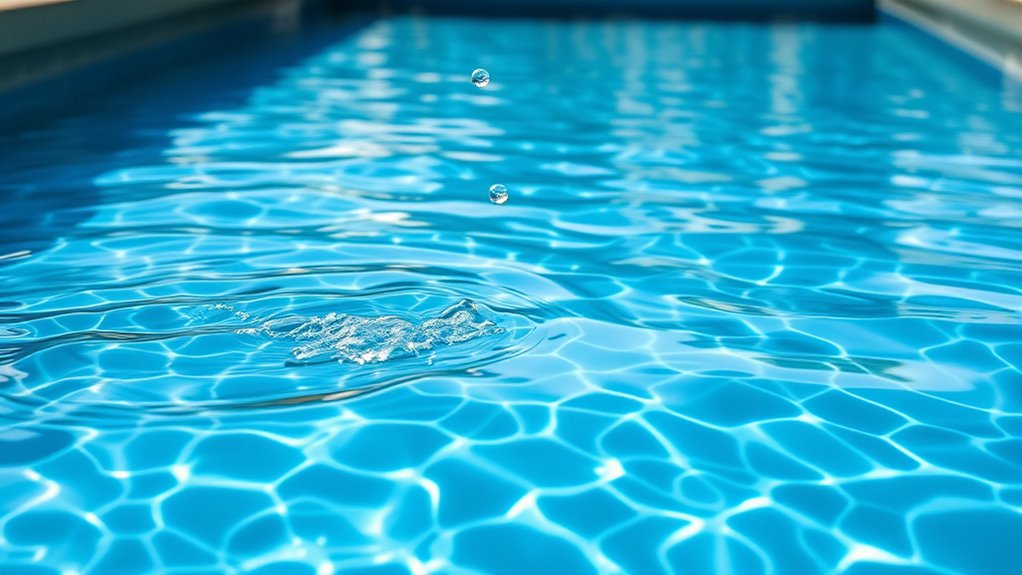
While both chlorine and saltwater systems are popular choices for pool sanitation, they operate differently to keep your pool clean. Chlorine systems rely on adding liquid or tablet chlorine directly to your pool, which quickly kills bacteria and algae. You control chlorine levels manually, ensuring the water stays sanitized. Saltwater systems, on the other hand, generate chlorine through a salt-chlorine generator that converts salt into chlorine automatically. This process creates a steady, low level of chlorine in your pool, reducing the need for frequent chemical additions. The key difference is how chlorine enters the water: direct addition versus in-situ generation. Both systems effectively sanitize your pool, but understanding their mechanisms helps you choose the right fit for your maintenance style and pool needs. Pool sanitation involves different methods of maintaining clean and safe water, each with its own advantages.
Cost Implications and Maintenance Requirements
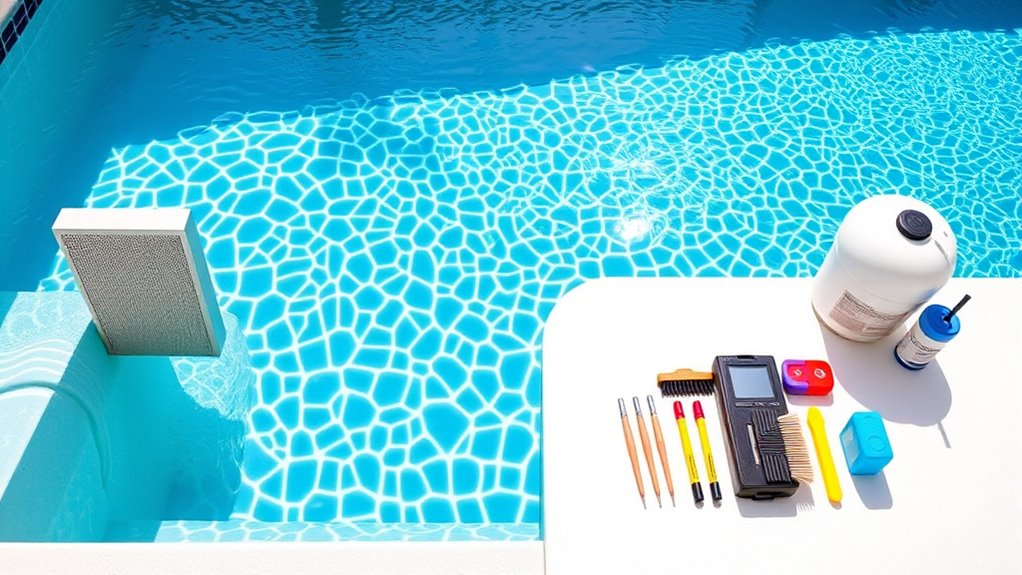
When comparing saltwater and chlorine systems, your budget and ongoing maintenance play significant roles in choosing the right setup. Saltwater systems typically have higher initial costs due to equipment and installation but tend to cost less over time on chemicals. Chlorine systems usually require lower upfront investment but demand more frequent chemical purchases and maintenance. Here’s a quick comparison:
| Aspect | Saltwater System | Chlorine System |
|---|---|---|
| Initial Cost | Higher due to equipment | Lower to install |
| Ongoing Maintenance | Lower chemical costs; equipment upkeep | Frequent chemical purchases; cleaning |
While saltwater systems need less regular chemical handling, they may involve more equipment maintenance. Chlorine systems are straightforward but require ongoing chemical management. Proper system maintenance can extend the lifespan of your equipment and ensure safe, clean water.
Skin and Eye Comfort Considerations
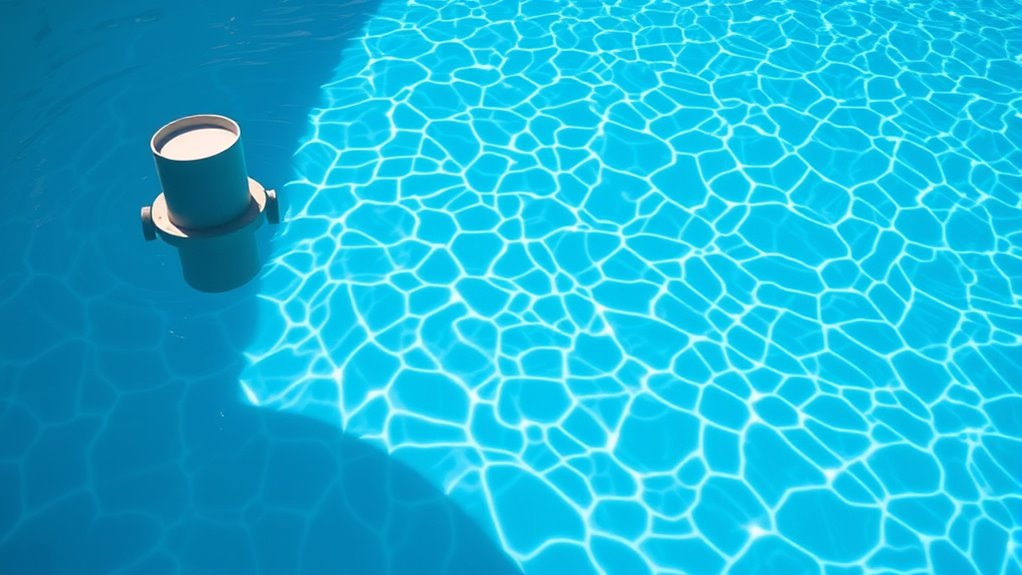
You might notice that saltwater pools often cause less skin irritation than chlorinated ones, making them gentler on your skin. However, your eyes could feel more comfortable in a saltwater environment, especially if you’re sensitive to chemicals. Considering these comfort factors can help you choose the pool type that’s best for your skin and eyes. Additionally, understanding pool water safety measures can further enhance your swimming experience and health.
Skin Irritation Levels
Saltwater pools generally cause less skin and eye irritation than chlorine pools, making them more comfortable for sensitive skin. The lower chlorine levels in saltwater systems reduce the harshness that often leads to dryness, redness, and itching. With saltwater, you’re less likely to experience the stinging sensation that chlorine can cause, especially after prolonged exposure. This difference is particularly noticeable for those with delicate or sensitive skin. Saltwater pools maintain a more balanced pH, which minimizes irritation and keeps your skin feeling softer. Additionally, color accuracy in saltwater systems helps ensure a gentler experience overall. While both systems can cause some irritation if not properly maintained, saltwater pools typically offer a gentler environment for your skin. If skin comfort is a priority, a saltwater pool provides a more soothing, less irritating environment for your skin.
Eye Comfort Factors
Because saltwater pools typically have lower chlorine levels and a more stable pH balance, they tend to be gentler on your eyes compared to traditional chlorine pools. This means less irritation and discomfort during or after swimming. To better understand, consider this table:
| Pool Type | Chlorine Level | pH Stability | Eye Comfort |
|---|---|---|---|
| Saltwater | Lower | More stable | Higher comfort |
| Traditional | Higher | Less stable | More irritation |
| Both | Varies | Varies | Varies |
| Ideal Conditions | Controlled | Balanced | Reduced irritation |
| User Experience | Comfortable | Less irritated | More enjoyable |
Additionally, pH stability plays a crucial role in minimizing eye irritation and enhancing overall swimmer comfort. Choosing a saltwater system can help guarantee your eyes stay comfortable, making your swim more enjoyable.
Environmental Impact and Sustainability
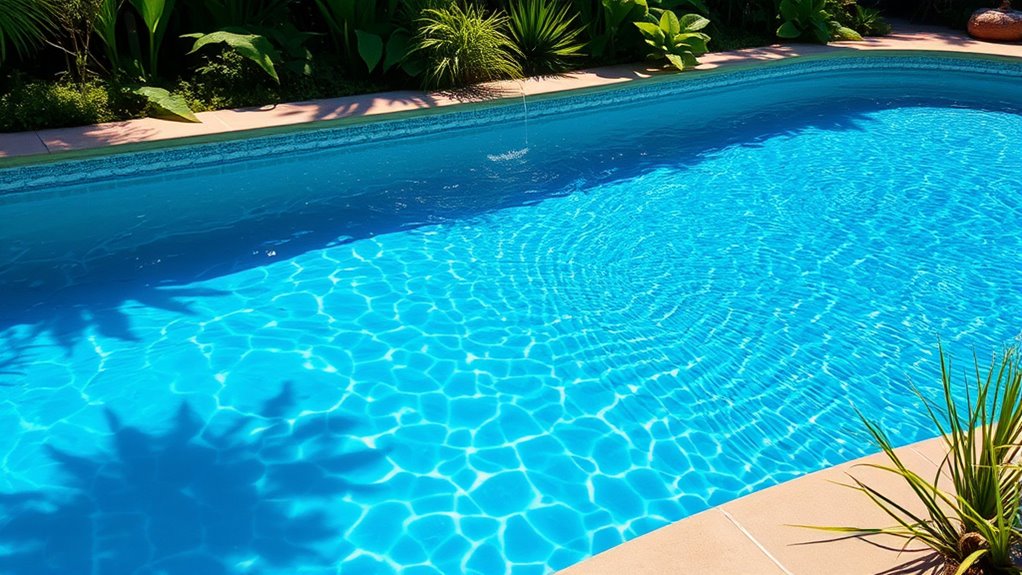
When considering saltwater and chlorine pools, you should think about their environmental impact and sustainability. Eco-friendly maintenance practices can reduce resource use and waste, making your pool more sustainable. By choosing the right system, you can minimize energy consumption and lessen your ecological footprint. Additionally, selecting energy-efficient technologies can further enhance your pool’s sustainability and reduce long-term environmental effects.
Eco-Friendly Maintenance Practices
Eco-friendly maintenance practices are gaining importance as pool owners seek sustainable options that minimize environmental impact. You can start by choosing systems that reduce chemical use, such as saltwater chlorination, which produces fewer harmful byproducts. Regularly maintaining your pool’s pH and sanitizer levels prevents overuse of harsh chemicals, lowering runoff and pollution. Using eco-conscious cleaning products and filtration systems also helps reduce chemical waste. Additionally, investing in energy-efficient pumps and heaters decreases electricity consumption, cutting down your carbon footprint. Properly managing water levels and avoiding unnecessary refills conserve freshwater resources. Incorporating Honda Tuning principles into your pool maintenance, such as optimizing equipment for efficiency, can further enhance sustainability. By adopting these practices, you not only protect the environment but also promote healthier swimming conditions, making your pool a greener and more sustainable addition to your home.
Resource Consumption and Waste
Both saltwater and chlorine pools impact resource consumption and waste generation in different ways. Saltwater pools require the ongoing use of electricity for the salt-chlorine generator, which consumes energy and contributes to your carbon footprint. They also produce salt waste that can accumulate over time, needing periodic water replacement or dilution. Chlorine pools, on the other hand, depend heavily on chemical production and transportation, which involve energy-intensive processes and generate chemical waste. Additionally, frequent chemical additions can lead to excess runoff, potentially harming the environment. While saltwater pools may seem more sustainable, their energy use and salt waste pose environmental challenges. Chlorine pools generate chemical waste but often require less frequent water replacement. Your choice impacts not only your pool’s maintenance but also its environmental footprint. Glycolic acid products and their benefits highlight the importance of considering sustainable options in skincare and maintenance routines.
Equipment Durability and Longevity
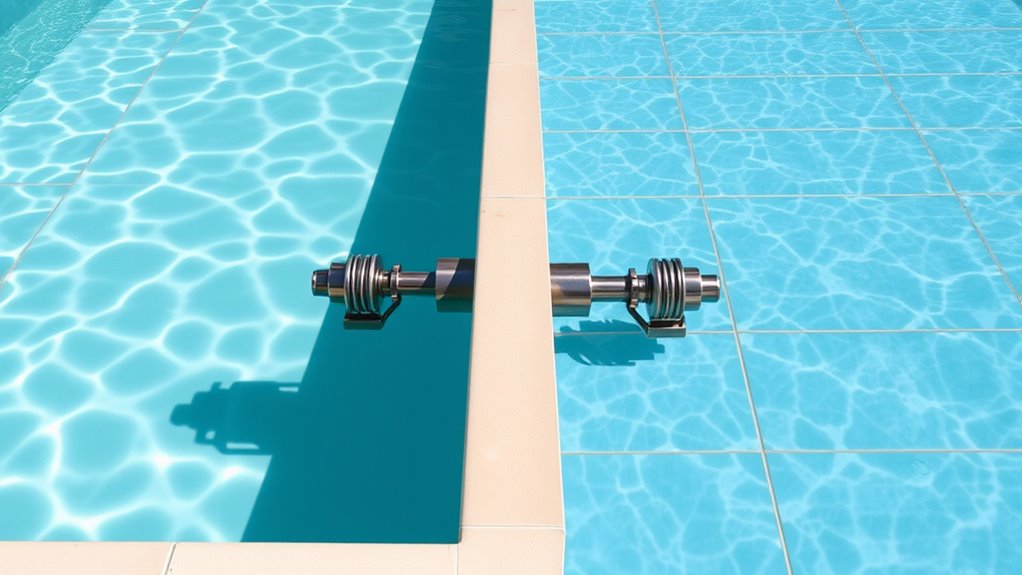
Saltwater systems generally offer greater durability and longevity compared to traditional chlorine setups. Because they use a salt cell to generate chlorine on-site, there’s less reliance on harsh chemical handling and frequent replacements. Your salt generator’s components tend to resist corrosion better, especially if you maintain proper water chemistry. This means fewer repairs and a longer lifespan for your equipment. In contrast, chlorine systems involve chemical feeders and pumps that face more wear and tear over time. Saltwater systems also experience less buildup of scale or mineral deposits, which can degrade equipment. Additionally, vendor reliability plays a crucial role in ensuring consistent performance and minimizing downtime. Overall, investing in a saltwater setup can reduce maintenance costs and extend your system’s lifespan, making it a more durable choice for long-term pool ownership.
Safety and Handling of Pool Chemicals
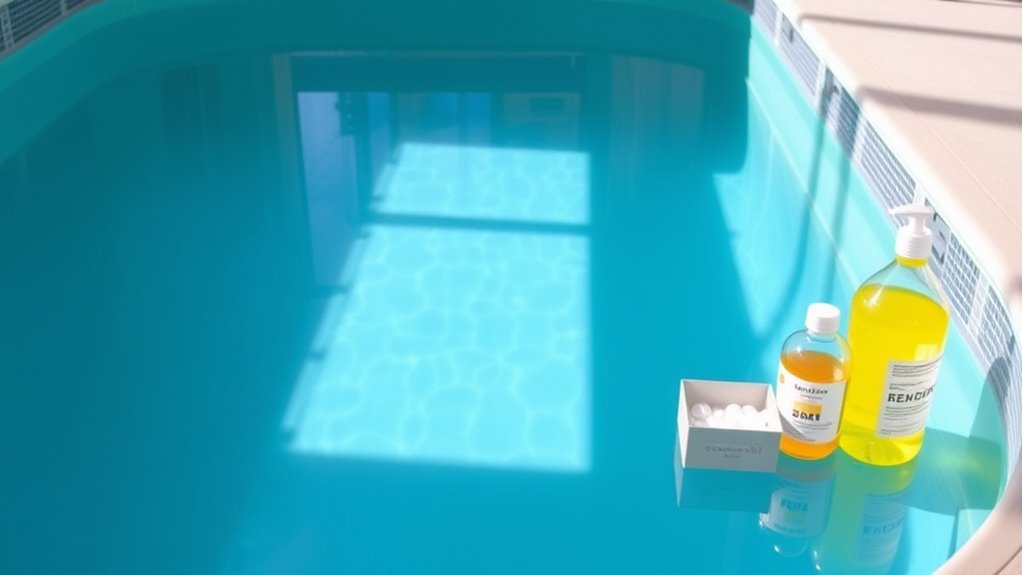
Handling pool chemicals requires careful attention to guarantee your safety and that of your family. Always read labels and follow manufacturer instructions closely. Wear protective gear like gloves and goggles when handling chemicals. Store chemicals in a cool, dry, well-ventilated area away from children and pets. Mixing chemicals can cause dangerous reactions, so add chemicals separately and never combine them directly. Use the table below to understand the importance of proper handling:
| Precaution | Why it matters | Best practice |
|---|---|---|
| Wear protective gear | Prevents chemical burns and irritation | Gloves, goggles, mask |
| Store safely | Avoids accidental exposure | Locked cabinets, dry area |
| Add chemicals carefully | Prevents dangerous reactions | Follow instructions precisely |
| Keep chemicals separate | Avoids hazardous mixes | Store in labeled, separate containers |
| Ventilate area | Reduces inhalation risks | Open windows or use exhaust fans |
Additionally, staying informed about the different types of pool chemicals can help you make safer choices and better understand handling procedures.
Effect on Pool Accessories and Surfaces
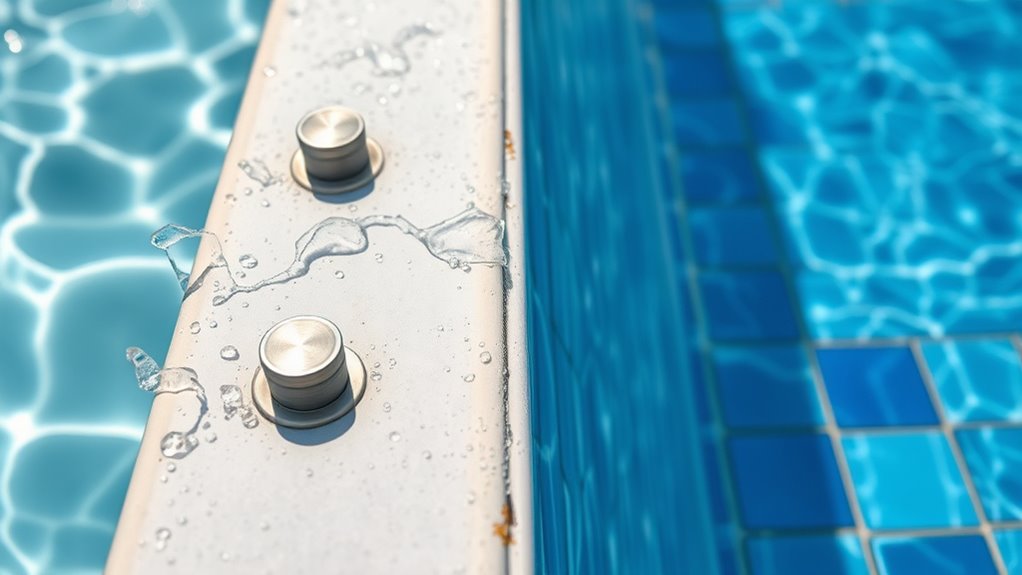
While saltwater systems are generally gentle on pool surfaces and accessories, they can still cause wear over time if not properly maintained. Salt can corrode metal fixtures, ladders, and handrails, leading to rust and deterioration. Vinyl liners and plastic accessories may become brittle or discolored with prolonged exposure to salt, especially if levels fluctuate. However, with regular maintenance and proper chemical balancing, you can minimize these effects. Chlorine pools, on the other hand, tend to be less corrosive, but high chlorine levels can degrade rubber seals, gaskets, and plastic components more quickly. Overall, both systems can impact your pool’s accessories and surfaces, but consistent upkeep and monitoring can extend their lifespan regardless of the sanitizer used.
Making the Right Choice for Your Lifestyle
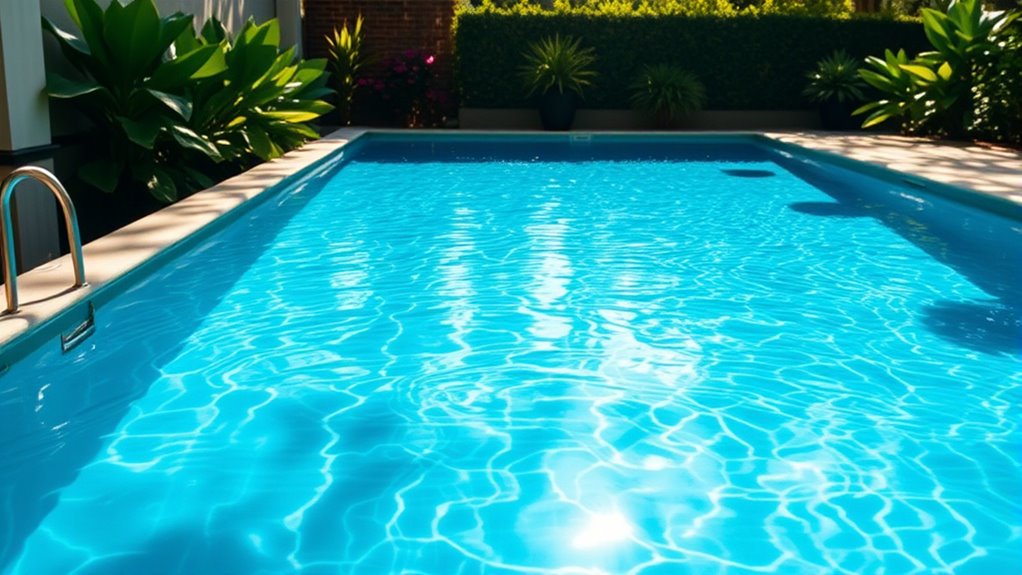
Choosing between saltwater and chlorine pools ultimately depends on your lifestyle and priorities. If you prefer minimal maintenance and softer water, a saltwater system might suit you best. It’s generally gentler on your skin, eyes, and pool equipment, making it ideal if you spend a lot of time swimming or have sensitive skin. On the other hand, if you want a more straightforward setup with lower upfront costs and easier chemical adjustments, chlorine pools could be a better fit. Consider your budget, time commitment, and how often you use your pool. Also, think about any sensitivities or allergies. The right choice aligns with your daily routine, comfort preferences, and long-term maintenance willingness. Ultimately, selecting the best option supports your enjoyment and pool longevity.
Frequently Asked Questions
Which System Is Better for Allergy Sufferers?
Saltwater systems are generally better for allergy sufferers because they produce fewer irritants and reduce the amount of harsh chemicals in your pool. You’ll find it easier to breathe and experience less skin and eye irritation. With fewer chemicals, your allergies are less likely to flare up. Plus, saltwater pools often require less maintenance, making them a more comfortable, healthier choice for those sensitive to traditional chlorine.
How Do Saltwater and Chlorine Affect Pool Heating Efficiency?
Saltwater pools often heat more efficiently because the salt system produces fewer chloramines, which can cause odor and irritation that hinder heating. Chlorine pools may require more energy to maintain ideal temperatures due to these compounds. You’ll find that saltwater pools generally have a more consistent and quicker heating process, saving you energy and money over time. So, if heating efficiency matters, saltwater systems are usually the better choice.
Are There Specific Maintenance Tips for Saltwater Pools?
You should regularly check your salt levels, chlorine levels, and pH balance to keep your saltwater pool in top shape. Clean the salt cell and filter monthly to prevent buildup and guarantee peak performance. Rinse your pool’s surfaces and skimmers weekly, and keep an eye out for corrosion or wear on equipment. Using a water testing kit helps you stay on top of chemical balances, making pool maintenance easier and more effective.
Can Both Systems Be Used in Indoor Pools?
Absolutely, both systems can be used in indoor pools. You’ll find that saltwater and chlorine setups adapt well indoors, though saltwater pools may need extra ventilation to handle the salt and prevent corrosion on equipment. Chlorine pools are more straightforward for enclosed spaces. Whichever you choose, guarantee proper circulation and maintenance, so your indoor pool stays sparkling clean and inviting, creating an oasis that rivals the world’s most luxurious resorts.
What Is the Typical Lifespan of Each System’s Equipment?
You can expect the equipment in saltwater systems to last around 5 to 7 years, while chlorine systems’ components typically last about 8 to 10 years. Regular maintenance, water chemistry, and usage levels impact their longevity. Saltwater generators may require more frequent repairs or replacements of the cell, but both systems can serve you well if properly cared for, ensuring your pool stays clean and functional for years to come.
Conclusion
Choosing between saltwater and chlorine for your pool depends on your priorities, from comfort to cost. Did you know that saltwater pools typically require 30% less chemical maintenance? This can save you time, money, and irritation. Whether you prefer a gentler feel on your skin or a more eco-friendly option, understanding these differences helps you make the best choice. Ultimately, your pool should fit your lifestyle and bring you endless enjoyment.
